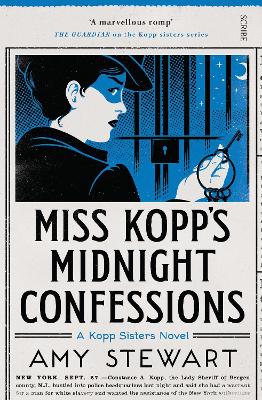Reviewed by MurderByDeath on
Reading updates
- Started reading
- 22 March, 2018: Finished reading
- 22 March, 2018: Reviewed

The feisty, fiery Kopp sisters are back in another unforgettable romp by HWA-longlisted international bestseller Amy Stewart.
When deputy sheriff Constance Kopp notices how many young women are being jailed over dubious charges of waywardness, incorrigibility, and moral depravity, she smells a rat. But what can she do to fight the forces of sexism? And how will her principles fare when her own sister, Fleurette, starts misbehaving?
Against the backdrop of the First World War, and drawn once again from the true story of the Kopp sisters, Miss Kopp’s Midnight Confessions is a spirited page-turner that will delight fans of historical fiction and light-hearted detective fiction alike.